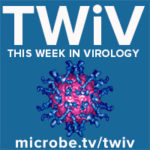 Hosts: Vincent Racaniello and Rich Condit
Hosts: Vincent Racaniello and Rich Condit
Vincent and Rich talk about how thymic selection of T cells might lead to better control of HIV-1 infection, and a mouse model for severe antibody-induced dengue virus disease.
This episode is sponsored by Data Robotics Inc.
Click the arrow above to play, or right-click to download TWiV #82 (59 MB .mp3, 82 minutes)
Subscribe (free): iTunes, RSS, email
Links for this episode:
- Effect of thymic selection of T-cells on control of AIDS
- Mouse model of antibody-induced severe dengue virus disease
- Natural antibody protects against viral infection
- Kary Mullis idea for fighting infections (thanks, Erik!)
- 40 nm resolution of fluorescence photoactivation localization microscopy (thanks, José)
- Letters read on TWiV 82
Weekly Science Picks
Rich The Mold in Dr. Florey’s Coat: The Story of the Penicillin Miracle by Eric Lax
Vincent Proteopedia (thanks, Erik!)
Send your virology questions and comments to [email protected].


Thanks for the great response to my question. And I must say, I feel very famous now. : )
I just realized that the a-gal epitope “technique” probably wouldn't work at all for HIV because I was forgetting the fact that the HIV genome is permanently in the host cell's genome. I guess maybe if the patient were given a steady stream of the drug it would prevent the virus from spreading once it buds from the host cells, but it wouldn't do anything to fully clear the virus infection.
I had to smile when you said that when a scientist is asked what inspired him/her to become a scientist it was a high school teacher. While I'm not yet a scientist, I think that will be my path, and it was my 10th and 12th grade biology/AP biology teacher, Mr. Becker, who made biology seem so magical to me, and really made me, i would say, “passionate” about biology. And it was my Intro to Biotech teacher, Mr. Bernard, who contributed to getting me interested in viruses.
It must feel amazing to influence a kid's interests to the extent that my teachers influenced mine.
~Erik
That's exactly why triple drug therapy can keep patients with AIDS
living for a long time, but can't cure the infection. There are
long-lived reservoirs of cells that contain proviruses that cannot be
deleted with drug therapy. The a-gal strategy could potentially limit
virus loads but would never remove the proviruses.
As for teachers inspiring scientists – I'm not sure how many teachers
know that some of their students go on to become scientists. We often
lose track of our teachers as soon as we leave high school. But I know
that I measure my own success by the success of the scientists that
train in my laboratory.
The stuff on dengue was very interesting. Even more so since I had dengue fever when my dad was stationed in Venezuela. It seems that on a trip to the interior, my sisters, my dad and I got bit by mosquitoes.
Bone break fever is an accurate description. Though, truthfully I don't remember much about those two weeks. Just the pain of the first few days, the rest is a blur.
I would like to return and visit the places in South and Central America that I lived in as a youth, but I do worry about the resurgence of dengue fever in some areas.
Thanks for the first-hand information. You should be careful about
going in any area where dengue virus is present. You are at risk for
severe dengue disease.
Now one of those areas is Florida!
Daughter wants to go to the Harry Potter theme park there. I think we'll wait until the dengue is managed.
Though perhaps there will be more attention to a dengue vaccine. Or design a mosquito that cannot transmit disease, somewhat like what is being done with malaria.
m listening it. and m loving it.
Hey TWiV guys.
You made the comment you didn't quite understand the reasoning behind T-cells not having as good a reaction when created in the presence of lots of possible antibodies.
To use an analogy it looks like it would be like taking a person, throwing them into training for lots of things, and giving them a limited amount of time.
The rate at which they learn is limited and so is the time. So if you have a few things to train for you can keep going at them until you get really good at recognizing them and doing what you need to do. However if you have lots of things to learn then you are unable to go into as much depth as you try and learn a little about a lot before the time is up.
This appears to be the same thing that happens to T-cells. The rate at which they 'learn' is fixed and so is the amount of time they have to learn. So they go for breadth instead of depth when 'learning' about new receptors to match against.
Keep up the great work,
James from Wellington.
Great episode; especially the T cell thymic selection paper discussion. As suggested, I was rewinding all day — through my run, on the drive home, while writing this note. Of course “rewind” assumes an old technology few of us are likely using. Perhaps “back-up”? No. “Rewind” still seems best; the word may long out live tape.
Rufus.